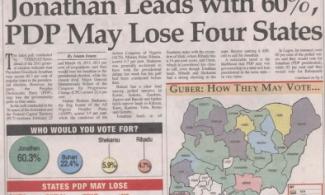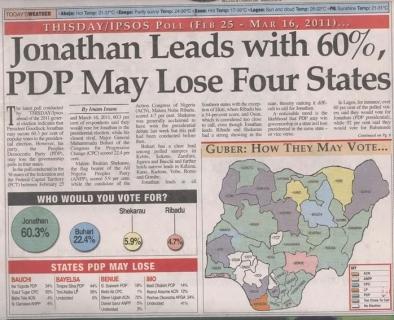
UPDATE: "Researchers shall always be prepared to make available the technical information necessary to assess the validity of any published findings" - ICC-ESOMAR Code of Conduct. Our attention has been drawn to the latest official Ipsos response to this controversy as published by ThisDay In this response, the global CEO of Ipsos, Mr. Didier Truchot, states: "Contrary to what WeBeNaija asserts, it is not standard practice to give out raw data as this includes proprietary weighting techniques." Seeing as Mr. Truchot is a global CEO, whose time and availability are (as we say in Nigeria) "essential commodities", we will not fault him for this response. We accept the possibility that Mr. Truchot may not have been fully briefed on (or otherwise apprised of) the things we are asking his Nigerian polling outpost to provide to the Nigerian people. We know that Mr. Truchot is a busy man, so we will just skip all the backgrounds and details and simplify this for him and everyone concerned by cutting and pasting the relevant portion of our requests (which we sent to his Nigerian representative (Mr. David Somers) on Friday, April 1st, 2011). (begin snip) We are all about honouring contractual obligations and respecting confidentiality. We would not suggest that you breach your contract with ThisDay or any other party. However, we would like to ask you some specifics and we hope that you will kindly respond in kind: • Does your contract with ThisDay, in the conduct of this polling exercise, specifically PREVENT you from releasing the cross tabs of the polls? • Are you barred by ThisDay from telling Nigerians HOW LARGE the pool of possible respondents were? • Does this contract prevent you from revealing how many of the original 11,000 respondents were ALSO part of the second round of interview? • Are you barred from disclosing the SOURCE of the pool of respondents? • The geographical dispersion of the 11,000 respondents (how many per state, local government, etc). • The age/sex/education/income/occupation/native tongue/religion/party affiliation/etc of the 11,000 respondents. • Does this contractual obligation forbid you to discuss any particulars of the final 1730 "sampling points" referenced in your report? (end snip) We hope that Mr. Truchot will find a gap in his understandably busy schedule to tell the world again where WeBeNaija has erred in this request. Which of the items requested above is UNCOMMON for a researcher to provide in support of its research, especially when the result, reliability and objectivity of the research and its methodologies are in question? Specifically, what CAN Ipsos provide to the Nigerian public for a peer review exercise of its polling results? END OF UPDATE --------------------------------------------
Dear Mr. Somers: With reference to the public release of the results of the latest polls your organisation conducted on behalf of the ThisDay news organisation we would like to (once again) request that your organisation make available to independent, competent third-parties in the country the relevant portion of the data that form the input for the conclusions that you have drawn in these results.

UPDATE: "Researchers shall always be prepared to make available the technical information necessary to assess the validity of any published findings" - ICC-ESOMAR Code of Conduct. Our attention has been drawn to the latest official Ipsos response to this controversy as published by ThisDay In this response, the global CEO of Ipsos, Mr. Didier Truchot, states: "Contrary to what WeBeNaija asserts, it is not standard practice to give out raw data as this includes proprietary weighting techniques." Seeing as Mr. Truchot is a global CEO, whose time and availability are (as we say in Nigeria) "essential commodities", we will not fault him for this response. We accept the possibility that Mr. Truchot may not have been fully briefed on (or otherwise apprised of) the things we are asking his Nigerian polling outpost to provide to the Nigerian people. We know that Mr. Truchot is a busy man, so we will just skip all the backgrounds and details and simplify this for him and everyone concerned by cutting and pasting the relevant portion of our requests (which we sent to his Nigerian representative (Mr. David Somers) on Friday, April 1st, 2011). (begin snip) We are all about honouring contractual obligations and respecting confidentiality. We would not suggest that you breach your contract with ThisDay or any other party. However, we would like to ask you some specifics and we hope that you will kindly respond in kind: • Does your contract with ThisDay, in the conduct of this polling exercise, specifically PREVENT you from releasing the cross tabs of the polls? • Are you barred by ThisDay from telling Nigerians HOW LARGE the pool of possible respondents were? • Does this contract prevent you from revealing how many of the original 11,000 respondents were ALSO part of the second round of interview? • Are you barred from disclosing the SOURCE of the pool of respondents? • The geographical dispersion of the 11,000 respondents (how many per state, local government, etc). • The age/sex/education/income/occupation/native tongue/religion/party affiliation/etc of the 11,000 respondents. • Does this contractual obligation forbid you to discuss any particulars of the final 1730 "sampling points" referenced in your report? (end snip) We hope that Mr. Truchot will find a gap in his understandably busy schedule to tell the world again where WeBeNaija has erred in this request. Which of the items requested above is UNCOMMON for a researcher to provide in support of its research, especially when the result, reliability and objectivity of the research and its methodologies are in question? Specifically, what CAN Ipsos provide to the Nigerian public for a peer review exercise of its polling results? END OF UPDATE --------------------------------------------
Dear Mr. Somers: With reference to the public release of the results of the latest polls your organisation conducted on behalf of the ThisDay news organisation we would like to (once again) request that your organisation make available to independent, competent third-parties in the country the relevant portion of the data that form the input for the conclusions that you have drawn in these results.
In its public defence of the published results of the first ThisDay/Ipsos polls , Thisday/Ipsos sought to establish Ipsos' bona fide by, inter alia, stating as follows:
"Ipsos fully adheres to the ICC-ESOMAR International Code of Marketing and Social Research."
On that basis, we would like to draw your attention to the following portions of the ICC-ESOMAR Code of Conduct and then remind you that, unless (and until) you do the equitable thing and release the DATA (not just the results), your organisation is not only flouting the Code of the very authority you have cited in your attempt to burnish your credibility, your organisation is also engaging in in outright fraud and electoral malpractices by releasing these scurrilous polls results at such a crucial and delicate time in the Nigerian political journey. A less charitable observer might be tempted to infer that you are jeopardising the very stability of the Nigerian state not simply by your meddling in its political process at this late juncture, but also by your willingless (nay propensity) to do so with impunity.
According to the ICC-ISOMAR Code of Professional Conduct:
• Market research depends for its success on public confidence – that it is carried out honestly, objectively and without unwelcome intrusion or disadvantage to its participants. The publishing of this Code is intended to foster public confidence and to demonstrate practitioners’ recognition of their ethical and professional responsibilities in carrying out market research.
• Market researchers shall ensure that projects and activities are designed, carried out, reported and documented accurately, transparently and objectively.
• Market researchers shall behave ethically and shall not do anything which might damage the reputation of market research.
• Market research shall be legal, honest, truthful and objective and be carried out in accordance with appropriate scientific principles.
• Researchers shall not act in any way that could bring discredit on the market research profession or lead to a loss of public confidence in it.
• Market research shall be conducted with professional responsibility and conform to the principles of fair competition, as generally accepted in business.
• Researchers shall ensure that market research projects are designed, carried out, reported and documented accurately, transparently and objectively.
• Researchers shall always be prepared to make available the technical information necessary to assess the validity of any published findings.
• Researchers shall not allow their name to be associated with the dissemination of conclusions from a market research project unless they are adequately supported by the data.
All we are asking (and have been asking Ipsos Nigeria and Ipsos in the Sub-Sahara Africa) to do is LIVE UP TO ITS PROFESSIONAL OBLIGATIONS by releasing the necessary information to help us determine whether or not they are trustworthy and reliable, or they are just some fly-by-night hatchet operators engaged in nefarious politicking.
"Researchers shall always be prepared to make available the technical information necessary to assess the validity of any published findings" - That is what the ICC-ISOMAR code says, and Ipsos has been swearing by ICC-ISOMAR since the beginning of time. They now either put up, or shut up. Release the data.
Finally, we would like to draw Ipsos's attention to "Guidelines on Agents, Intermediaries and Other Third Parties" as disseminated by the ICC. We will suggest that, if Ipsos Nigeria itself is not complicit in this charade, it owes itself and the community it seeks to serve an obligation to adhere to the prescriptive guidance contained in the afore-referenced guideline and refrain from further involvement in the conduct of these suspect cash-and-carry polls. It then needs, as a matter of necessity and for the sake of its reputation, make available to the public the dataset it relied on to obtain the results it purportedly arrived at for ThisDay. We are unable to foresee any downside from such third-party validation of the polls exercise. Ipsos cannot (and should not attempt to) hide behind the fig leaf of "contractual obligations". In our considered opinion, contractual obligation is not an effective legal defense to an accusation of impropriety. We have not accused Ipsos of such a conduct, but public opinion does not appear to be as restrained as we are in this matter.
Saliu Ogbeh
Ebun Ajanaku
WeBeNaija
N.B: Please note that we shall be making the above available to the online community by publishing same on Sahara Reporters (http://www.saharareporters.com)